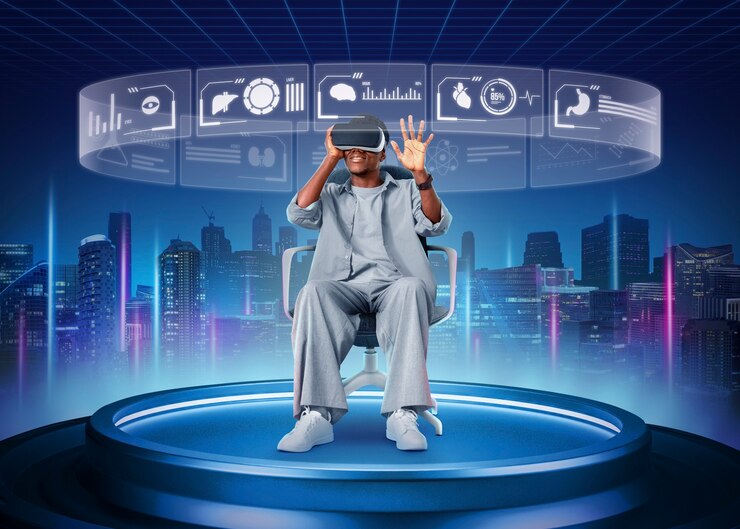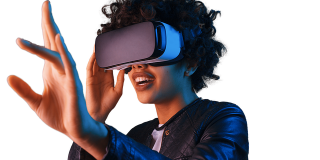For the last two centuries, technology has been the driving force behind innovation in human society. From horse-drawn carriages, we have come to jet planes.
Similarly, from room-sized computers, humans have moved to 12-inch laptops. The vast shift has been possible because of technology.
But today, we are about to witness the peak of technology, an innovation that promises to reshape our tomorrow.
We are talking about the latest sensation, metaverse, which aims to revolutionize the way human beings interact with the world and each other.
The emergence of the metaverse has compelled business, education, and other sectors to consider integrating this advanced technology.
The concept of the metaverse has transitioned from science fiction to a tangible and transformative force in our lives. metaverse, with its advanced features, offers an entirely new realm of possibilities for these sectors to reshape human societies.
But along with its unique possibilities, the integration of the metaverse also presents some new challenges. This article will explore the implications, challenges, and potential benefits of metaverse integration.
Defining the Metaverse
The term metaverse is a Greek word. It is a combination of two words: meta(beyond) and verse(universe). The literal meaning of metaverse is “beyond the universe”.
Neal Stephenson used the term metaverse in his fiction novel Snow Crash for the first time in 1992. Now, coming to the concept, the metaverse is a virtual space where users can interact with computer-generated environments, socialize with others, and experience a blend of real and virtual worlds.
The technology offers an artificial world in which users can conduct experiments and experience things that are not possible to experience in real life. The metaverse provides aa 3D world with the help of virtual reality (VR) and augmented reality(AR).
Implications for Human Society
Metaverse integration holds the potential to reshape the way human beings work, socialize, learn, and entertain their selves.
In the professional realm, remote work could be revolutionized, as colleagues collaborate in virtual offices and attend meetings in immersive environments.
This shift could enhance productivity and break down geographical barriers, fostering a more interconnected global workforce.
Education stands to benefit as well. With the metaverse providing immersive learning experiences, students could explore historical events, conduct virtual experiments, and engage in interactive simulations, enriching the educational process. As a result, the technology could transform the entire educational system.
The metaverse’s impact on social dynamics is noteworthy, as people connect in virtual spaces, transcending physical distances and cultural boundaries.
People will be able to experience things that they won’t be able to or wish to experience in real life. Virtual tourism and gaming are some of the prime examples.
Challenges in the Metaverse Integration
Despite the promises of the metaverse, integration comes with its share of challenges. Privacy concerns, ethical considerations, and the digital divide are among the foremost issues that need addressing.
The immersive nature of the metaverse raises questions about data security and the potential misuse of personal information. Striking a balance between innovation and safeguarding individual privacy is crucial.
Additionally, ethical considerations surrounding virtual experiences, such as virtual crime or harassment, need to be addressed to ensure a safe and inclusive from cyber world of metaverse.
Bridging the digital divide is also imperative to prevent exacerbating existing inequalities. Ensuring equitable access to metaverse technologies is crucial for widespread adoption and avoiding the creation of a technological elite.
Potential Benefits of Metaverse Integration:
Metaverse integration offers a myriad of benefits across various sectors. In healthcare, virtual reality applications can facilitate remote medical consultations, surgical simulations, and therapeutic interventions.
Patients could access healthcare services from the comfort of their homes, potentially reducing the strain on traditional healthcare systems.
The entertainment industry is poised for a revolution, with immersive virtual experiences redefining gaming, movies, and live events.
Virtual concerts, sports events, and interactive gaming experiences are already gaining traction, providing new avenues for creativity and entertainment. This shift could democratize content creation, allowing independent creators to reach global audiences.
Economic opportunities abound in the metaverse, ranging from virtual real estate to the creation and sale of digital assets.
Blockchain technology, often integrated into metaverse platforms, facilitates secure ownership and transactions of virtual assets, opening up new avenues for entrepreneurship and innovation.
Final Notes:
The metaverse is not a distant concept but a rapidly evolving reality that holds transformative potential across various aspects of our lives.
While challenges such as privacy concerns and ethical considerations exit and must be addressed, but, the benefits of metaverse integration are undeniable.
From revolutionizing remote work and education to creating new economic opportunities and immersive entertainment experiences, the metaverse is set to redefine the way we interact with the digital realm.
As we navigate this evolving landscape, it is essential to prioritize inclusivity, ethical practices, and responsible innovation to ensure a metaverse that enriches rather than exploits the fabric of our society.





 Case studies
Case studies Career
Career